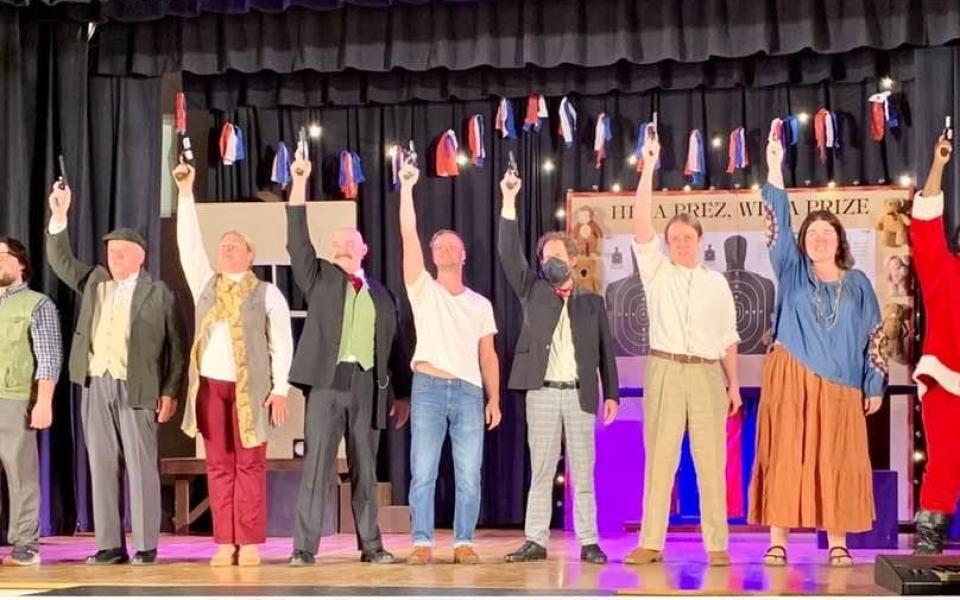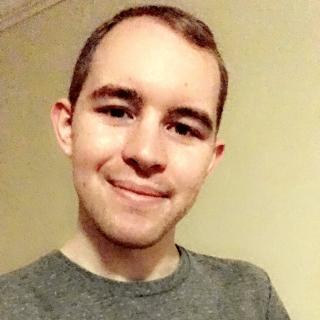Bright, gleaming lights illuminate a stage in the darkened expanse as dozens look on. Applause fills the room in the Congressional United Church of Christ as the actors trickle out onto the stage. A woman entrenched in long, brown hair with a tie-dye shirt takes the center. She’s left alone with her thoughts, until another woman sits beside her. They both smile and engage in friendly conversation, an everyday scene so far. Their talk veers into their love lives and they are shocked to learn their boyfriends are both named Charles. Their attitudes then take a strange turn as one proclaims it a sign from above. The mood darkens. It turns out that one of the women is a girlfriend of Charles Manson while with her new partner in crime, Sarah Jane Moore who happens to be the girlfriend of a less significant Charles, would become notorious in her own right as the would-be assassin of President Ford.
Another seemingly normal scene plays out on stage. A crowd of people mingle at a carnival midway, with games and prizes. But the banner atop the shooting gallery says “SHOOT A PREZ. WIN A PRIZE.” The audience realizes that all of the characters are people they have heard of in horror stories and history classes: The most infamous assassins in American history. The play being performed is Assassins, which ran at the Greensboro Cultural Arts Center from Aug. 21-28. The production was put on by Triad Pride Performing Arts, an organization which focuses on performing works written by or about members of the LGBTQ+ community. This 1990 musical dramedy by Stephen Sondheim and John Weidman exhibits the most notorious people in American history who have committed or attempted assassinations, including John Wilkes Booth and Lee Harvey Oswald.

The theme of the cycle of violence is successfully executed when the audience is transported from the carnival to where it all began with Booth as the catalyst. An anthology of sorts emerges as it displays each character in their own timeline. Throughout each story, Booth is present as the devil on the shoulder, urging the others to commit their crimes.
“The reason we did this show was because of the current political landscape,” said Stephen Hale, the artistic director of the Triad Pride Acting Company and the director of Assassins. “All the talk about gun rights and the rough political election season that’s coming up. It was originally written in 1990 and some of the themes that were written 30 years ago are still relevant today.”
Despite the heavy concept, the singing voices of the cast reverberate across the hall to great applause, while the jokes cause roaring laughter.
The audience bellows with guffaws at the sight of Charles Manson’s lover throwing loose bullets at Gerald Ford, while shouting “Bang!… Bang!… BANG!” and a drunken Santa Claus, who shouts obscenities.
The goofiness and seriousness are balanced with scenes like the execution of Giuseppe Zangara, the would-be assassin of President Franklin D. Roosevelt. As he sits in his final chair showing no signs of remorse, a merry band of witnesses surrounds him and brightly sings about their 15 minutes of fame from witnessing the assassin’s deed. The grand crescendo comes as the electricity courses through the chair and kills Guiseppe.
“I think it is a dark comedy,” said Hale. “The playwrights have taken these vignettes and linked them together where they assassinated presidents throughout the years and they each have a story to tell. There’s a lot of humor in the context of the show.”
As the show nears its end, the infamous killers gather around Lee Harvey Oswald as they urge him to cement all of their legacies as assassins. Their voices echo across the hall as if they were in Oswald’s mind. Oswald tells John Wilkes Booth, “I didn’t come here to shoot the president,” as Booth responds “Well, he didn’t come here to be shot.”
Learn more about the Triad Pride Acting Company on their website here.
Join the First Amendment Society, a membership that goes directly to funding TCB‘s newsroom.
We believe that reporting can save the world.
The TCB First Amendment Society recognizes the vital role of a free, unfettered press with a bundling of local experiences designed to build community, and unique engagements with our newsroom that will help you understand, and shape, local journalism’s critical role in uplifting the people in our cities.
All revenue goes directly into the newsroom as reporters’ salaries and freelance commissions.


Leave a Reply